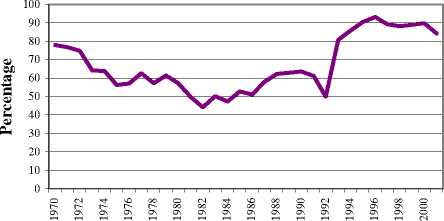K. Ludi: consumption behaviour in Zambia
adjustment program, prescribed by donor organisations, which resulted in food subsidies
being cut. However, civil unrest forced the government to abandon this program in 1987
(Biz/ed 2005).
Current PCE levels have declined and remained at low levels as a result of the many
interaction effects between Zambia’s poorly performing economy, the severely high
poverty levels, and the devastating effects of HIV/AIDS in the region.5 High short-term
interest rates (between 25 and 36 per cent) from 1998 onwards also hampered PCE
expenditure. Not reflected in the data presented are the PCE figures for 2002. It is
expected that this figure will be disappointing due to severe food shortages induced by a
bad drought, which has pushed inflation to levels approximated at 20 per cent.
Figure 4 shows the percentage of total consumption expenditure represented by PCE.
Consistent with the extremely high poverty rate, and with the low levels of economic
development prevalent in Zambia, PCE as a percentage of total expenditure has been at
high levels, approximating 85 per cent in 2001.
Figure 4: Real PCE as a percentage of total consumption expenditure (1970 - 2001)

Figure 5 shows the trends in PCE as a percentage of GDP, otherwise known as the
average propensity to consume (APC).
Life expectancy at birth is currently 35 years, partly due to an HIV/AIDS adult prevalence rate of
21.5 per cent (CIA 2004).
More intriguing information
1. The Impact of Hosting a Major Sport Event on the South African Economy2. The name is absent
3. Urban Green Space Policies: Performance and Success Conditions in European Cities
4. The name is absent
5. The name is absent
6. Activation of s28-dependent transcription in Escherichia coli by the cyclic AMP receptor protein requires an unusual promoter organization
7. Special and Differential Treatment in the WTO Agricultural Negotiations
8. The name is absent
9. The name is absent
10. Reputations, Market Structure, and the Choice of Quality Assurance Systems in the Food Industry